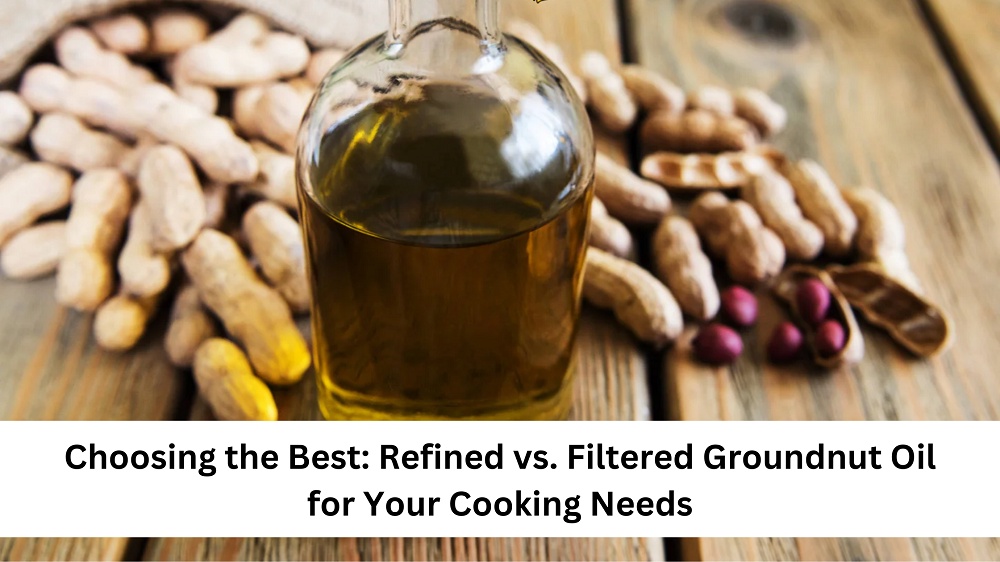When it comes to selecting the right cooking oil for your culinary endeavors, the choice between refined and filtered groundnut oil can be a pivotal one. Both varieties offer unique characteristics and benefits, but understanding the differences can help you make an informed decision that suits your cooking needs and preferences.
Understanding Refined Groundnut Oil
Refined groundnut oil undergoes a rigorous extraction and refining process to remove impurities and enhance its purity and stability. This process typically involves mechanical pressing followed by chemical extraction and refining methods such as degumming, neutralization, bleaching, and deodorization. While refining improves the oil's shelf life and smoke point, it may also strip away some of its natural nutrients and flavor compounds.
Exploring Filtered Groundnut Oil
Filtered groundnut oil, on the other hand, is extracted through a simpler method that involves mechanical pressing followed by filtration to remove any solid particles or impurities. This minimal processing helps retain more of the oil's natural flavor, aroma, and nutrients, making it a popular choice for those seeking a more wholesome and unadulterated cooking oil.
Nutritional Comparison
In terms of nutritional content, both refined and filtered groundnut oils are rich in monounsaturated and polyunsaturated fats, which are beneficial for heart health. However, filtered groundnut oil may contain slightly higher levels of antioxidants and vitamin E due to its less intensive processing method.
Flavor and Aroma
Refined groundnut oil has a neutral flavor and aroma, making it suitable for a wide range of cooking applications without overpowering the taste of other ingredients. In contrast, filtered groundnut oil retains more of the nutty flavor and aroma of the groundnuts, adding a distinctive taste profile to dishes.
Smoke Point and Cooking Uses
One significant difference between refined and filtered groundnut oil is their smoke points, which determine their suitability for different cooking methods. Refined groundnut oil has a higher smoke point, making it ideal for high-temperature cooking methods such as frying, sautéing, and roasting. Filtered groundnut oil, with its lower smoke point, is best suited for light sautéing, salad dressings, and other low-heat cooking techniques.
Read more: Is Groundnut Oil Good for Health? — Everything You Need To Know
Storage and Shelf Life
Both refined and filtered groundnut oils should be stored in a cool, dark place away from heat and light to prevent oxidation and rancidity. However, refined groundnut oil typically has a longer shelf life due to its more extensive refining process, whereas filtered groundnut oil may have a shorter shelf life and require refrigeration to maintain freshness.
Cost Considerations
In terms of cost, refined groundnut oil is often more affordable than filtered groundnut oil due to its mass production and higher availability. However, the price may vary depending on factors such as brand, quality, and production methods.
Choosing the Best Option
When selecting between refined and filtered groundnut oil, consider factors such as flavor preferences, cooking methods, nutritional benefits, and budget constraints. If you prefer a neutral-tasting oil with a higher smoke point for frying and deep-frying, refined groundnut oil may be the better choice. On the other hand, if you value the natural flavor and nutritional content of the oil and plan to use it for light cooking or as a finishing oil, filtered groundnut oil may be more suitable.
Conclusion
In conclusion, both refined and filtered groundnut oils have their own set of advantages and limitations, making them suitable for different cooking needs and preferences. By understanding the differences between the two varieties and considering factors such as flavor, smoke point, nutritional content, and cost, you can choose the best option to elevate your culinary creations and promote healthier cooking habits.
FAQs
-
Is refined groundnut oil healthier than filtered groundnut oil?
- While both refined and filtered groundnut oils offer health benefits, filtered groundnut oil may retain more of the oil's natural nutrients and antioxidants due to its minimal processing method.
-
Can I use refined groundnut oil for salad dressings?
- Yes, refined groundnut oil's neutral flavor and high smoke point make it suitable for salad dressings, marinades, and other culinary applications where a mild-tasting oil is desired.
-
Does filtered groundnut oil require refrigeration?
- Filtered groundnut oil may benefit from refrigeration to prolong its shelf life and prevent rancidity, especially in warm climates or if it is not used frequently.
-
Can I substitute refined groundnut oil for filtered groundnut oil in recipes?
- Yes, you can substitute refined groundnut oil for filtered groundnut oil in most recipes, keeping in mind the differences in flavor, aroma, and smoke point.
-
Are there any health risks associated with consuming groundnut oil?
- While groundnut oil is generally safe for consumption, individuals with peanut allergies should avoid it to prevent allergic reactions. It's essential to read labels carefully and consult a healthcare professional if you have known allergies or sensitivities.


No comments yet